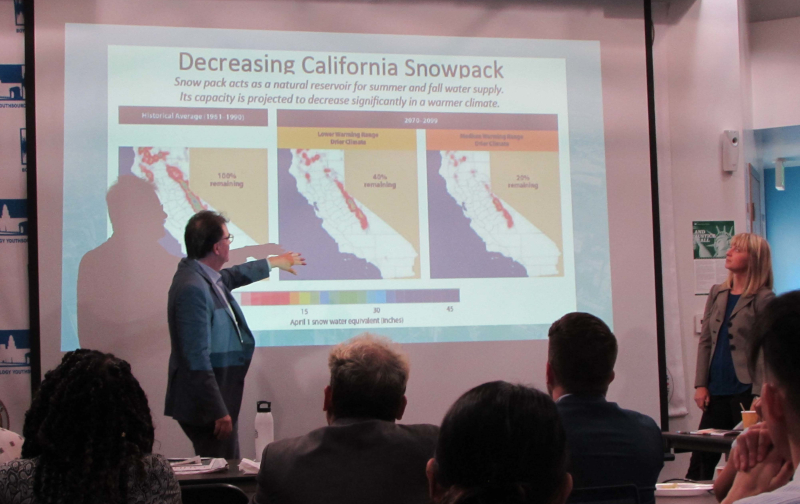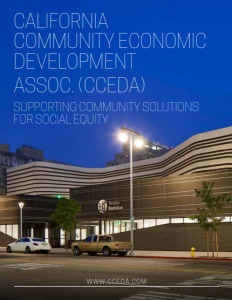California Community Economic Development Association (CCEDA)
Supporting community solutions for social equity
Business View Magazine interviews Roberto Barragán, Executive Director of California Community Economic Development Association (CCEDA)
The California Community Economic Development Association (CCEDA) serves as an exceptional resource for information and action that advances the field of community economic development through training and continuing education, technical assistance, and advocacy on public policy. CCEDA’s membership is comprised of organizations actively engaged in revitalizing California’s neighborhoods, including resident-driven community development corporations, local governments, community action agencies, and faith-based institutions.
CCEDA members produce results through a wide spectrum of community building strategies, including real estate development, housing, retail and commercial business assistance and lending, social services, and job training and creation. Business View Magazine asked CCEDA Executive Director, Roberto Barragán, for his insights into current issues for member organizations and the value of the Association in the support of community and economic development throughout California. His responses were both candid and enlightening.
BVM: Can you share a brief history of CCEDA?
Barragán: The organization was started in 1989 by a number of high-performing executives running community development corporations here in California. These corporations were established in the 1970s and ‘80s to focus on very specific diverse communities and communities of challenge – lower income communities such as East Los Angeles, the Mission district of San Francisco, South Los Angeles, Oakland and San Diego. Executives seeking to come together to help grow the industry, help grow their organizations, look for funding, and to seek advocacy support in Sacramento and in DC for the work they were doing in affordable housing, social enterprises, community facilities, childcare facilities, health clinics – all focused on revitalizing the comprehensive wellbeing of underserved communities throughout the State of California.

BVM: How would you describe the current mandate?
Barragán: Our current mandate is similar although our member organizations have expanded. Not only are they community development corporations, they are also community development financial institutions (CDFIs) – fully certified community lenders focusing on small businesses, on individuals, on community facilities, and community action agencies. There are about 60 community action agencies in California that are on the leading edge of anti-poverty programs largely funded by the federal government, including everything from food banks to energy assistance to childcare throughout the State.
So our mandate is to support community development organizations of many types with real estate development and technical assistance, with social enterprise development and expansion, as well as fund development and fund raising support. Added to that is our support to organizations of color, particularly CDFIs who are trying to establish themselves and grow.
We prioritize the community economic development priorities of non-profit organizations and how we can help them meet their goals. Whether it’s training, webinars, technical assistance, or research, we try to be that additional source of support that they need to move their agenda.
BVM: What methods do you use to help all these different agencies?
Barragán: CCEDA is small in size, with about four full-time staff. But we have about a dozen consultants across the State of California, who are available to us whenever we have an organization that is seeking to pursue a real estate agenda or to raise money. We provide assistance through training (which used to be in person but has now gone to Zoom and webinars), as well as direct technical assistance. We will hold one or two training sessions per month on a number of subjects, all in support of non-profits trying to pursue a community economic agenda.
In addition, for organizations that would like additional one-on-one assistance from an experienced and skilled consultant, we will create that match. We are funded with a combination of State of California dollars, financial institution and corporate dollars, and fee for service. So in many cases, we are able to provide real estate consultant services to a non-profit at no charge. Other times, for example: we just completed a feasibility study for a community development corporation in Modesto, and the local community foundation paid for it.
BVM: Do you have a resource base for all the information you compile?
Barragán: Yes. We actually have a whole series of “how-to” information manuals that are available online. People can access all kinds of material from our website, such as how to expand your community facility. How to establish a social enterprise. How to set up a micro-loan fund. We’ve done extensive research over the years to develop a resource of best practices and make that available to our members online.
Every week our members receive a newsletter outlining funding opportunities that are available from the public or private sector. And we do a monthly newsletter that talks about what’s going on in the industry. We have about 200 members scattered throughout the State. There is some concentration in urban areas, such as Los Angeles and the Bay area. But the fact is that we have many members in rural California, and over the last two years, CCEDA has been trying to bring services to those members; emphasizing that unless we resolve rural community issues, as much as we’re trying to resolve urban community issues, we can never bring them together to achieve the common goal of economic well being for all communities.
One area we’re particularly focused on right now is that there are very few African-American and Latino community development financial institutions (CDFIs) – and that’s a big problem that needs to be addressed. During this Covid-19 pandemic, Black and Latino businesses were rejected at twice the rate as non minority businesses. We have seen greater approval rates by Black and Brown CDFIs. We’re trying to promote the growth of those organizations and establish new ones throughout California.

BVM: With the recent impacts of climate events, have you been called upon more often for help?
Barragán: Yes. In 2019, CCEDA launched a Climate Adaption Initiative with the support of Chase and Bank of the West – with the belief that while there’s a lot of conversation about climate resiliency and putting in solar panels to provide for electricity, and taking a lot of other costly steps to deal with climate change, communities of color and low-income communities don’t have those kinds of resources. For those communities, the conversation is not so much about resiliency as it is about adapting. Finding ways to mitigate the bigger challenges of climate change is the goal.
We received a lot of appreciation for that 2019 initiative and then beginning early last year, with the help of the State of California Community Services Division, we put together a Climate Adaption Resource Guide for organizations serving communities of color. Addressing how they implement strategies to adapt to climate change, including the establishment of cooling centers, as in Riverside, where the Community Action Riverside has set up a network of 60 cooling centers, so people have someplace to go for relief during the summer heat, without having the high cost of using air conditioning. Those kind of strategies are discussed in our resource guide available through the CCEDA website.
In addition, the State of California had developed a climate regional assessment, identifying the challenges that we’re going to face due to climate change. We took that document and turned it into nine documents that spoke to the climate adaption needs in nine regions across the State. With the support of Pacific Premier Bank this year, we both launched the Resource Guide and made it available to everyone, and we also launched nine webinars with professionals talking about climate adaption with local community organizations to help them set up impactful strategies .
We’ve seen a lot of interest from younger folks in climate adaption and had a lot of participation from them on our webinars. Climate is really a bigger issue for younger people, who are starting to realize that if something isn’t done, they’re going to be inheriting a much more challenging world with climate change.
BVM: How will CCEDA continue to be a viable voice for Community Economic Development in California going forward?
Barragán: That’s a very timely question. Right now much of what community development organizations do involves social equity and a lot of CCEDA’s focus is on social equity. There are so many African-American and Latino communities that have been forgotten, have not been served, have not been invested in for decades. And I think that people are finally realizing that this level of neglect is not good for society, not good for this State, not good for the country.
We have to finally address the issue of social equity in our communities and have the uncomfortable conversation that says it’s no longer tolerable. It’s not just about writing a cheque, it’s looking at what we can do to help communities become sustainable over the long term. The State government and more local governments are looking at that now and CCEDA is striving to be part of that conversation and part of the solution making.
AT A GLANCE
California Community Development Association (CCEDA)
What: An organization advancing the field of community economic development in the State of California
Where: Based in Los Angeles, California
Website: www.cceda.com


